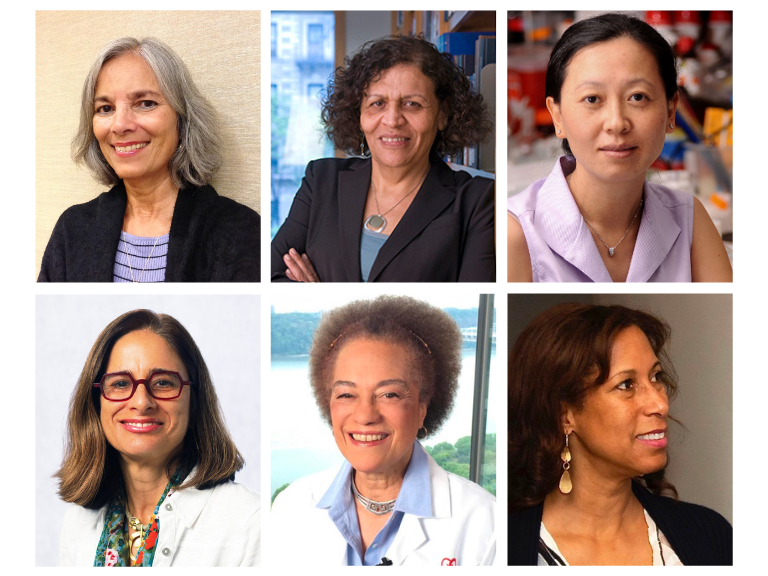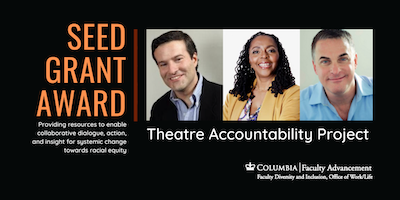Metrics and Evaluation Work Group Releases Seed Grant Report
Released this month, the Seed Grant Initiative Impact Report reviews key findings from the analysis of the Seed Grants issued in Fall of 2020.

Released this month, the Addressing Racism Seed Grant Initiative Impact Report reviews key findings from the analysis of the Addressing Racism Seed Grants issued in the Fall of 2020. The 57 funded projects reached more than 6,300 participating individuals, including faculty, students, staff, alumni and neighboring community members.
We spoke with Nabila El-Bassel, University Professor and Willma and Albert Musher Professor of Social Work, who chaired the committee that produced the report.
How has your work as part of the Provost’s Advisory Council for the Enhancement of Faculty Diversity led you to this project?
I have been a member of the Advisory Council since its inception in 2014. We advise the Provost on developing, advancing, and retaining outstanding faculty, and address pathways programs and other initiatives.
Faculty on this council serve on one or more committees: LGBTQ+, University Climate, Inclusive Faculty Pathways, and Metrics and Evaluation. I chair the Metrics and Evaluation Working Group, which is charged with evaluating the success metrics of the projects led by the Office of the Vice Provost for Faculty Advancement. We just completed our initial report evaluating the short- and long-term impact of the Provost-funded Addressing Racism Seed Grants.
Related Links
The other members of the Metrics and Evaluation Working Group are Ana Abraido-Lanza, Helen Lu, Maria Victoria Murillo, Anne Taylor, and Gina Wingood. Kristen Barnes, Associate Director for Faculty Diversity and Inclusion, served as project manager. Mohamad Adam Brooks, PhD candidate in School of Social Work, provided data analysis support. Members of the Faculty Advancement team, Adina Berrios Brooks, Vina Tran, and Jen Leach, and Manuela Luengas Solano, GSAS Academic Fellow, copyedited the report.
Why was the project of evaluating this seed grants program of particular interest to you?
For over 25 years, I have conducted research related to the design of evidence-based solutions to public health problems and social issues including substance misuse, gender-based violence, HIV, and other communicable diseases. I examine the major drivers (such as racism, discrimination, and stigma) that prevent people from accessing prevention, care, and intervention.
I believe in the power of access to evidence-based solutions with a strong emphasis on issues of diversity, equity, inclusion, and belonging (DEIB). I believe that the data and the evaluation of these pilot projects will contribute to more effective approaches that better serve our broader communities.
Funding faculty for pilot research to address racism, justice, inclusion and belonging in CU is a strategic investment with far-reaching implications. It is consistent with institutional values; enhances research excellence; contributes to policy change; promotes inclusive education; and fosters a collaborative, inclusive climate to address racial inequities and combat racism.
What was your process in evaluating the projects?
We used mixed methods, including an online survey with open- and close-ended questions along with in-depth faculty interviews. We asked about project goals, objectives, the evaluation processes, and future plans to secure funding.
What were your key findings?
The respondents overwhelmingly expressed the importance of Columbia providing funding mechanisms in support of faculty-led antiracism efforts.Neighboring community members are key stakeholders, and should have a voice in this process. For these projects to be sustainable and enduring, it is crucial that schools and departments provide resources to fund, evaluate, and disseminate findings. Although faculty reported that the budgets for their grants were woefully small, their projects enhanced the visibility and strength of the message about the importance of DEIB at Columbia. The pilots also created a feeling of urgency for departments and schools to invest more on research, education, mentorship and community engagement in issues of DEIB, mobilizing them to pursue additional funding to sustain the programs launched through the grants.
In compiling the report, were there any noteworthy insights?
I was very impressed to see how the projects created partnerships not only within schools and departments, but also across the university. The highest impact projects focused on community and student engagement, multidisciplinary collaboration, and reach. Our neighbors have become true partners. Many stakeholders of color came from social services and health care agencies, churches, Broadway theaters, and industry. Several projects targeted organizations and community leaders in Harlem to further develop our relationships there.
Furthermore, mentorship for students was an integral part of these pilots, and student voices provided a vital contribution. Several projects also engaged alumni, both fostering their involvement in important societal issues and reconnecting them to Columbia.
How does this work connect to Columbia’s Fourth Purpose, as stated by former University President Lee Bollinger, of merging our distinctive intellectual capacities with groups and organizations beyond the academy to bring about meaningful change?
The mission of the Addressing Racism seed grants program aligns well with the mission of the Fourth Purpose, specifically in transforming knowledge into community and societial impact. The multidisciplinary nature of the projects created enduring connections between faculty across departments, schools, and campuses. Finally, the funded projects provided opportunities for engaged learning through hands-on education and reflection to improve the curricula, research, services, mentorship and collaboration both within and outside Columbia’s campuses.
Can you share an example of one high-impact project?
Three School of the Arts faculty partnered with the Black Theatre Coalition in the Theatre Accountability Project, which sought to develop pathways workshops for early career Black, Indigenous People of Color (BIPOC) industry professionals. The program provided educational programming for students and alumni to learn about career opportunities within the theatre industry. Industry executives, most of whom were BIPOC, provided mentorship for workshop participants. 45 formerly unemployed or non-industry-engaged scholars attended the workshops, and today, more than 50% of the participants are industry-engaged and/or employed. This program now provides pipeline and mentoring services for students in the School of the Arts and School of Law.
How will this upcoming round of seed grants be different from the previous ones?
As a result of faculty feedback, the program scope has changed to support seed grants that will have a societal impact and benefit public good, in alignment with the university’s Fourth Purpose. The level of pilot funding has been increased, and it will be augmented through cost-sharing. Schools and Departments and/or external funders will match seed grant funding provided by the Office of the Provost at a 2:1 rate. With this additional funding, we can allow for more community voices to be heard through targeted engagement with groups such as civil society organizations, industry, nonprofits, and community groups. Grant recipients also underscored the importance of evaluating the lasting impact of their projects on participating individuals and communities, and said that more funding would be needed for this.
What opportunities do you envision to make this work (creating and evaluating interdisciplinary seed grants) replicable, scalable and sustainable?
The good news is that several faculty have already published peer-reviewed papers from their pilots. Others have received funding to disseminate and expand their pilot findings on addressing racism to different communities.
In order to sustain this program, schools and departments should consider providing resources to faculty to disseminate the findings from the pilot projects through presentations, debates, podcasts, social media, and the like. Moreover, school leaders should provide resources for faculty to write more external grant proposals to foster multi-disciplinary collaborations across Columbia and its surrounding communities.
After conducting the first centralized, systematic, and rigorous evaluation of Addressing Racism seed grant funding at Columbia, the Metrics and Evaluation team was able to revise the program to better meet the needs of future grant recipients. The research team sees a real opportunity for centralized metrics and evaluation for university-wide projects.
